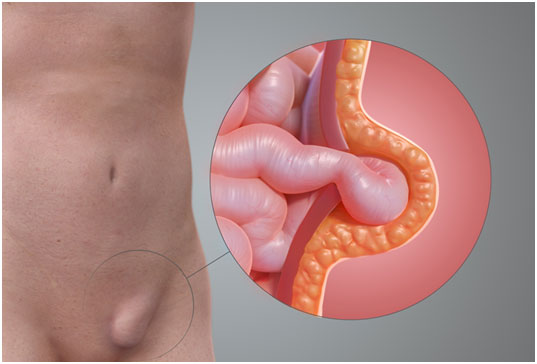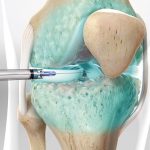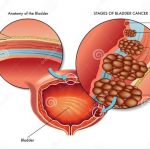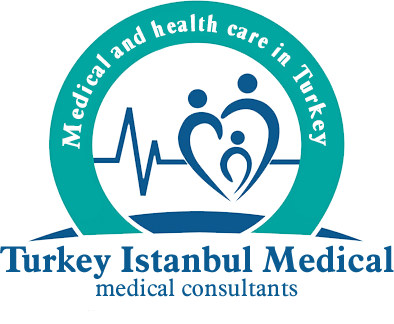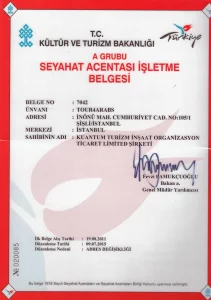Inguinal Hernia
These are the hernias that develop in the groin area. An inguinal hernia accounts for 75% of all hernias and is 25 times more common in men than in women.
There are three types called direct, indirect and femoral. In general, all three types are similar, but the indirect one can be seen at any age and can extend to the testicular sac.
A direct inguinal hernia is usually seen in middle and advanced age when the abdominal wall is weakened. Femoral hernias are rarer than other types. The same surgery is performed in the treatment of all three types.
Although an inguinal hernia usually looks harmless, your doctor will usually recommend surgery after examining it. Because the compression of the hernia and the complications that can develop afterwards can be intimidating, even life-threatening..
What Are The Symptoms Of An Inguinal Hernia?
Some inguinal hernias do not cause any complaints. Sometimes you don’t realize you have a hernia until it’s detected during a doctor’s examination.
There is often swelling in the groin area. This swelling is most evident when standing, pushing, or coughing.
By lying on your back, the swelling usually goes away. Sometimes there may be burning when bloating, a feeling of tight air, and pain. The feeling of pressure in the groin area can be painful and burning when lifting a heavy object.
In less cases, there may be swelling in the scrotum due to the hernia landing in the scrotum.
What is a Stuck Inguinal Hernia?
Most of the time, the hernia bulge flattens out when you lie on your back. This flattening occurs as a result of the return of the omentum or the small intestine, which enters the hernia sac, into the abdomen.
These organs cannot return to the abdomen and if they remain in the hernia sac it is called a stuck hernia. This condition is often painful.
This is called a strangulated hernia, which is the next step if the blood supply to the organs in the trapped area is cut off as a result of the compression. Strangulated hernias unfortunately require emergency surgery and can lead to life-threatening complications.
What are the symptoms of a Squeezed Inguinal Hernia?
- Nausea, vomiting, loss of appetite
- Inability to perform gas and large ablutions
- Sensation of abdominal bloating and gas pain
- High temperature
- Increased pulse
- Rapidly exacerbating abdominal and groin pain
- Bruising or flushing may occur in the color of the swollen hernia.
Which are the Symptoms of Inguinal Hernia?
In some cases, there may not be a detectable cause. But the following can be counted among the causes of hernia:
- Increased intra-abdominal pressure
- Pre-existing weak points in the abdominal wall
- Heavy ablution or straining during urination (enlarged prostate and chronic constipation)
- Heavy lifting
- Fluid buildup in the abdomen (acidic fluid can build up in liver disease or heart failure)
- Pregnancy
- Overweight
- Chronic cough and sneezing
Why is Inguinal Hernia more common in men?
Men have congenital pubic duct weakness. In male infants, the testes form in the abdomen and then descend through the inguinal canal into the testicular sac. The canal closes soon after birth.
Sometimes this channel cannot close properly, where a weak spot forms. For this reason, inguinal hernia is more common in men.
What are the risk factors for the formation of an Inguinal Hernia?
- Certain diseases (chronic lung disease, COPD, prostate disease, cirrhosis)
- Family history (if your loved ones have a history of hernia, you are more likely to have it than normal society)
- Chronic cough (smoking)
- Chronic constipation
- Being overweight (increases your intra-abdominal pressure)
- Pregnancy (weakens your abdominal muscles and increases intra-abdominal pressure)
- Certain occupations (occupations with long-standing and heavy physical working conditions and requiring heavy lifting)
- Being born prematurely
- Having previously suffered from a hernia on the opposite side
What are the feared complications of an Inguinal Hernia?
- The hernia grows over time and the testicular sac descends properly
- Compression of the hernia (may cause congested bowel obstruction)
- Strangulation of the hernia (bleeding from the trapped intestine is disturbed and gangrenous, and can develop into a life-threatening complication.
How is Inguinal Hernia Diagnosed?
Usually, only a hernia is diagnosed as a result of an examination. Sometimes very small hernias can be diagnosed by ultrasound.
